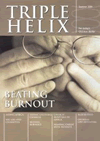Poverty and health are closely linked; but it is not as widely known that communicable diseases now account for 77% of the 25-year difference in life expectancy between rich and poor nations. Tropical climates, poor nutrition, ignorance about prevention and treatment of disease and poorly developed health systems all contribute. And according to Professor Jeffrey Sachs, a Harvard economist and chair of the World Health Organisation's commission on macroeconomics and health, the malaria and HIV-AIDS pandemics between them are now proving two of the most important factors shaping both economic development and health in the poor world.
In an effort to bridge some of the gap the World Health Assembly has recently announced a new global health fund to fight infectious disease in developing countries (BMJ 2001; 322:1321-2, 2 June). The aim is to raise £5-7bn to be donated for HIV-AIDS, malaria and tuberculosis, but so far the US and Britain have pledged only £216m between them, much of that with strings attached.
Recent history gives little cause for hope. The gap between the rich and poor world is widening with over 40% of the 614 million people in less developed countries now living in absolute poverty. Since OECD countries agreed 10 years ago to scale up their development assistance aid flow has actually decreased to its lowest level for 20 years. Rich country aid to sub-Saharan African countries in 1999 was £600m or about 91p per person per year.
It's not well appreciated that God's judgment of Sodom was as much as for her greed and indifference as her sexual immorality. According to Ezekiel, 'She and her daughters were arrogant, overfed and unconcerned; they did not help the poor and needy'. (Ezekiel 16:48-49) Not a bad description of the Western world in which we live! By contrast 'defending the cause of the poor and needy' (Jeremiah 22:16) and spending oneself on behalf of the hungry (Isaiah 58:10) is part of what knowing God is all about. I wonder how we measure up as Christian doctors in Britain today?
































